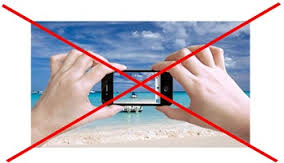“The business was still there when I got back” was the ah-ha revelation of John, a senior retail operations leader who dared go on holiday for two weeks without his cell phone. “In fact” he added, “my staff have grown as a result of taking decisions without me and taking responsibility for the business”.
 John had spent two weeks in Borneo and leading up to those two weeks had worked long hours to ensure that when his vocation arrived he would be in a position to completely relax and enjoy it. At the last moment, just before leaving for the airport, he had decided to leave his cell phone behind. “I realised that if I was to fully relax and disengage from the business I couldn’t be available 24/7 …something that would be made possible if I had my cell with me”. John added that the first adjustment to life without a cell phone happened immediately, “On the way to the airport I kept looking to where I usually placed my cell and it felt like I had forgotten something …like something important was missing”.
John had spent two weeks in Borneo and leading up to those two weeks had worked long hours to ensure that when his vocation arrived he would be in a position to completely relax and enjoy it. At the last moment, just before leaving for the airport, he had decided to leave his cell phone behind. “I realised that if I was to fully relax and disengage from the business I couldn’t be available 24/7 …something that would be made possible if I had my cell with me”. John added that the first adjustment to life without a cell phone happened immediately, “On the way to the airport I kept looking to where I usually placed my cell and it felt like I had forgotten something …like something important was missing”.
However, once there (Borneo) John spoke of how he was still able to maintain contact with his sons back home by using the hotel landline, “as we used to do 20 years ago” but that he had had another insight. “I noticed the cell phone behaviour of those around me. We would be in a magnificent setting and people had their heads down, totally focused on their cells. We would be at a restaurant and I couldn’t but help notice how couples wouldn’t be talking to each other but instead be totally immersed with their phones”. These observations were made possible by John stepping back from his own ‘norm’ – by putting himself in a position whereby he could now see what previously had been oblivious to him. The need for us to be able to step back, step away from in order to gain an alternative perspective is a fundamental prerequisite of effective leadership. It is also happens to be one of the most neglected of all leadership habits or disciplines.
In the future there will be legitimacy for those whose job it is to help others experience life ‘unplugged’. Consultants perhaps whose focus is to facilitate experiences free from technology for a generation for whom technology is as water is to fish. When you pause to consider this possibility it is not as far-fetched as it might at first seem. In fact any parent with teenage children can immediately see the need for this occupation. ‘Silence Consultants’ – an oxymoron if ever there was one!
John had a further insight through his ‘celless’ experience: “Getting news of what was happening had me reading newspapers,” he said. “I was still able to know what was going on it was just that I was finding out through a different channel”. Perhaps we don’t really need the barrage of information we are constantly subjected to through our instant access enabled by our smartphones. It is an information stream that becomes a deluge that has us believe that we can’t do without it. Periodically getting away from it might become an increasingly important act for every leader wishing to maintain perspective and stay alert. “The interesting thing for me” said John, “was that I experienced a truly relaxing holiday without having my cell phone – I relaxed in a way that I didn’t think was possible”.
There are some important take-outs from John’s experience:
1. Life as we know it without reliance on a cell phone is possible. It might become both increasingly elusive and attractive.
2. Others take responsibility when they don’t have constant access to ‘the boss’. ‘Switching off’ might be a great way to grow your people and nurture responsibility and ownership for decision-making.
3. We need to be ‘unplugged’ from time to time if we are to fully recharge, relax and gain a necessary perspective.
4. If we can’t – or find it very difficult to unplug from our reliance on such technology, why is that? What does that say about us?
5. The world won’t fall apart because we choose to ‘go silent’ for a period of time.
So, here is the challenge: why not try what John did? Why not ‘unplug’ for a period of time and see what happens? For most of us our cell phone is the thing that we spend the most time with – it is the last things we check before going to sleep and the first thing we engage with when we wake-up. Try altering that dependence and see what emerges. The benefits and insights might just surprise you…and if they do, you might want to pause and thank John!
Go on, I dare you.

